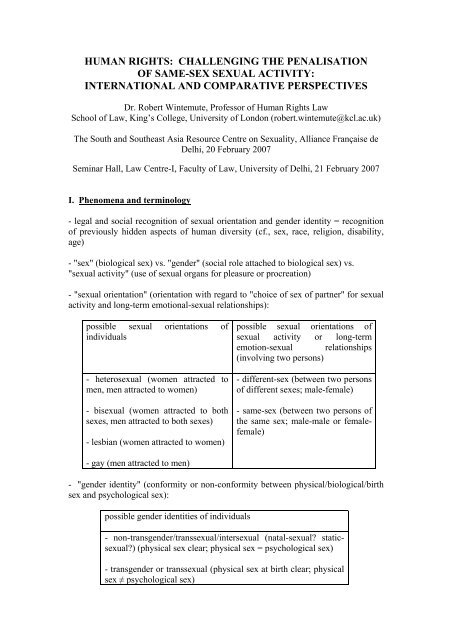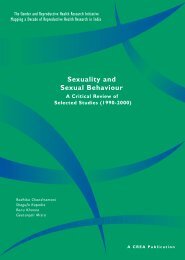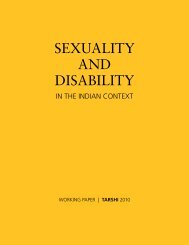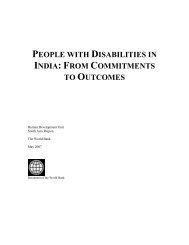HUMAN RIGHTS: CHALLENGING THE PENALISATION ... - TARSHI
HUMAN RIGHTS: CHALLENGING THE PENALISATION ... - TARSHI
HUMAN RIGHTS: CHALLENGING THE PENALISATION ... - TARSHI
Create successful ePaper yourself
Turn your PDF publications into a flip-book with our unique Google optimized e-Paper software.
<strong>HUMAN</strong> <strong>RIGHTS</strong>: <strong>CHALLENGING</strong> <strong>THE</strong> <strong>PENALISATION</strong><br />
OF SAME-SEX SEXUAL ACTIVITY:<br />
INTERNATIONAL AND COMPARATIVE PERSPECTIVES<br />
Dr. Robert Wintemute, Professor of Human Rights Law<br />
School of Law, King’s College, University of London (robert.wintemute@kcl.ac.uk)<br />
The South and Southeast Asia Resource Centre on Sexuality, Alliance Française de<br />
Delhi, 20 February 2007<br />
Seminar Hall, Law Centre-I, Faculty of Law, University of Delhi, 21 February 2007<br />
I. Phenomena and terminology<br />
- legal and social recognition of sexual orientation and gender identity = recognition<br />
of previously hidden aspects of human diversity (cf., sex, race, religion, disability,<br />
age)<br />
- "sex" (biological sex) vs. "gender" (social role attached to biological sex) vs.<br />
"sexual activity" (use of sexual organs for pleasure or procreation)<br />
- "sexual orientation" (orientation with regard to "choice of sex of partner" for sexual<br />
activity and long-term emotional-sexual relationships):<br />
possible sexual orientations of<br />
individuals<br />
- heterosexual (women attracted to<br />
men, men attracted to women)<br />
- bisexual (women attracted to both<br />
sexes, men attracted to both sexes)<br />
- lesbian (women attracted to women)<br />
possible sexual orientations of<br />
sexual activity or long-term<br />
emotion-sexual relationships<br />
(involving two persons)<br />
- different-sex (between two persons<br />
of different sexes; male-female)<br />
- same-sex (between two persons of<br />
the same sex; male-male or femalefemale)<br />
- gay (men attracted to men)<br />
- "gender identity" (conformity or non-conformity between physical/biological/birth<br />
sex and psychological sex):<br />
possible gender identities of individuals<br />
- non-transgender/transsexual/intersexual (natal-sexual? staticsexual?)<br />
(physical sex clear; physical sex = psychological sex)<br />
- transgender or transsexual (physical sex at birth clear; physical<br />
sex ≠ psychological sex)
2<br />
- intersexual (physical sex not clear at birth; often imposed on<br />
child as result of post-birth surgery; might or might not =<br />
psychological sex )<br />
- "LGBT persons" = lesbian, gay, bisexual and transgender persons (the combination<br />
of minorities defined by sexual orientation and minorities defined by gender identity)<br />
- most LGB persons are not transgender/transsexual/intersexual; a<br />
transgender/transsexual/intersexual person may be heterosexual, L, G or B<br />
II. Are LGB persons found in every country and culture around the world?<br />
(a) same-sex attraction or sexual activity or long-term emotional-sexual relationships<br />
vs.<br />
(b) lesbian or gay identity or culture or "lifestyle"<br />
- can "lesbian" and "gay" apply to (a) without implying an identity or culture or<br />
"lifestyle"?<br />
- are "lesbian" and "gay" terms that are not suitable in India?<br />
- are MSM ("men who have sex with men") and WSW ("women who have sex with<br />
women") more suitable?<br />
- what about MLM ("men who love men") and "WLW" ("women who love women")?<br />
- do MSM/WSW imply clandestine sexual activity consistent with discharging social<br />
duties (to enter into a traditional different-sex marriage and have children)?<br />
- do MLM/WLW or gay/lesbian mean acceptance that "I am different" and that a<br />
traditional different-sex marriage will not be right for me? so more threatening to a<br />
traditional society?<br />
- are there between 10,000,000 and 100,000,000 potential LGBs or MSM/WSWs or<br />
MLM/WLWs in India? (cf. Canada's total population of 32,400,000!)<br />
- S. Katyal, "Exporting Identity" (2002), 14 Yale Journal of Law and Feminism 97-176<br />
III. “International Trend 1”: Treating sexual orientation as a "suspect<br />
classification" (strong presumption against discrimination on this ground)<br />
A. Express inclusion in national or state constitution’s “equal protection clause”<br />
Brazil (States):<br />
Mato Grosso - Constitution, 1989, Article 10.III (“orientação sexual”)<br />
Sergipe - Constitution, 1989, Article 3.II (“orientação sexual”)<br />
Ecuador - Constitution, 1998, Article 23(3) (“orientación sexual”)<br />
Fiji Islands - Constitution Amendment Act 1997, s. 38(2)(a) (“sexual orientation”)<br />
Germany (States or Länder):<br />
Berlin - Constitution, 1995, Article 10(2), (“sexuelle Identität”)<br />
Brandenburg - Constitution, 1992, Article 12(2) (“sexuelle Identität”)<br />
Thuringia - Constitution, 1993, Article 2(3) (“sexuelle Orientierung”)<br />
Portugal – Constitution (as amended in 2004), Article 13(2) (“orientação sexual”)
3<br />
South Africa - Constitution of the Republic of South Africa Act (No. 200 of 1993),<br />
Section 8(2) (transitional Constitution) (“sexual orientation”); Constitution of the<br />
Republic of South Africa (No. 108 of 1996) (final Constitution), Section 9(3):<br />
“Section 9(3). The state may not unfairly discriminate directly or indirectly against<br />
anyone on one or more grounds, including race, gender, sex, pregnancy, marital<br />
status, ethnic or social origin, colour, sexual orientation, age, disability, religion,<br />
conscience, belief, culture, language and birth.” (emphasis added)<br />
B. Express inclusion in a European Union “equal protection clause”<br />
Charter of Fundamental Rights of the EU (7 Dec. 2000) (not legally binding): 1<br />
“Article 21(1). Any discrimination based on any ground such as sex, race, colour,<br />
ethnic or social origin, genetic features, language, religion or belief, political or any<br />
other opinion, membership of a national minority, property, birth, disability, age or<br />
sexual orientation shall be prohibited.” (emphasis added)<br />
C. Judicial interpretation of other “equal protection clauses”<br />
- James Egan & John Nesbit v. Canada, [1995] 2 S.C.R. 513 (Supreme Court of<br />
Canada), http://www.lexum.umontreal.ca/csc-scc/en (9-0 on principle that, under<br />
Section 15(1) of the Canadian Charter of Rights and Freedoms, part of the federal<br />
Constitution of Canada, sexual orientation is an “analogous ground” of discrimination,<br />
analogous to the “enumerated grounds”: race, national or ethnic origin, colour,<br />
religion, sex, age or mental or physical disability), paras. 5, 173-75<br />
- Smith & Grady v. United Kingdom, European Court of Human Rights (ECtHR), 27<br />
Sept. 1999, http://www.echr.coe.int (HUDOC, Case Title = Grady), para. 97<br />
(dismissal of lesbian and gay members of armed forces) (6-1): “To the extent that<br />
they represent a predisposed bias on the part of a heterosexual majority against a<br />
homosexual minority, these negative attitudes [of heterosexual members of the armed<br />
forces] cannot, of themselves, be considered by the Court to amount to sufficient<br />
justification for the interferences with the [lesbian and gay members’] rights ... any<br />
more than similar negative attitudes towards those of a different race, origin or<br />
colour.” [bold added here and in following two quotations]<br />
- Mouta v. Portugal, ECtHR, 21 Dec. 1999, para. 36 (transfer of custody of child<br />
from gay father to heterosexual mother) (7-0): “the [Lisbon] Court of Appeal made a<br />
distinction based on considerations regarding the applicant’s sexual orientation, a<br />
distinction which is not acceptable under the [European] Convention [on Human<br />
Rights] [like distinctions based on religion] (see, mutatis mutandis, ... Hoffmann ...<br />
[Jehovah’s Witness mother] ...).”<br />
- S.L. v. Austria, ECtHR, 9 Jan. 2003, para. 37 (age of consent of 18 to male-male<br />
sexual activity vs. 14 to male-female/female-female) (7-0): “the Court reiterates that<br />
sexual orientation is a concept covered by Article 14 [the “equal protection clause” of<br />
the European Convention] ... Just like differences [in treatment] based on sex, ...<br />
1 Art. II-81(1) of the Treaty establishing a Constitution for Europe (signed on 29 Oct. 2004) is<br />
identical to Art. 21(1) of the Charter, and would become legally binding if the Treaty were ratified by<br />
all 25 EU member states (ratification process stalled since negative referendum result in France).
4<br />
differences [in treatment] based on sexual orientation require particularly serious<br />
reasons by way of justification ...”<br />
- Edward Young v. Australia (Communication No. 941/2000), United Nations Human<br />
Rights Committee, 6 Aug. 2003, http://www.unhchr.ch/tbs/doc.nsf (Search the<br />
Database, “Edward Young”), para. 10.4 (equal treatment of unmarried same-sex and<br />
different-sex couples): “the prohibition against discrimination under article 26 [of the<br />
International Covenant on Civil and Political Rights, ratified by India in 1979]<br />
comprises also discrimination based on sexual orientation.”<br />
IV. “International Trend 2”: Gradual elimination of sexual orientation<br />
discrimination: From the death penalty for same-sex couples to equal access to<br />
civil marriage and adoption<br />
- 1300 - “those who have connection with Jews ... or are guilty of ... sodomy shall be<br />
buried alive in the ground” (P.Crane, Gays and the Law, Pluto Press, UK, 1982, 11-12)<br />
- 1642 - the death penalty for male-male “sodomy” in the Connecticut Colony (“If any<br />
man lyeth with mankind as hee lyeth with woman, both of them have committed<br />
abomination, they both shall surely be put to death.”); quoted by the 2004 exhibition<br />
(Jonathan Ned Katz, curator) “The Pink and the Blue: Lesbian and Gay Life at Yale<br />
and in Connecticut, 1642-2004”, Sterling Library, Yale University (William Plaine<br />
executed in New Haven in 1646; death penalty extended to female-female “sodomy”<br />
by New Haven Colony in 1656)<br />
- 1861 - death penalty for male-male anal intercourse repealed for England, Ireland<br />
and Wales (was there ever one in India? if so, when repealed?)
5<br />
European<br />
Union<br />
(first 15<br />
member<br />
states)<br />
(year law<br />
passed)<br />
equal age of<br />
consent to<br />
sexual<br />
activity (no<br />
exceptions)<br />
legislation<br />
against<br />
discrimination:<br />
employment<br />
2<br />
or<br />
services<br />
same-sex<br />
couples:<br />
same-sex<br />
couples:<br />
same-sex<br />
couples:<br />
same-sex<br />
couples:<br />
same-sex<br />
couples:<br />
register<br />
+<br />
equal rights<br />
+<br />
same name<br />
(civil<br />
marriage)<br />
register<br />
+<br />
register<br />
+<br />
adoption<br />
(child of<br />
joint<br />
adoption<br />
some<br />
rights<br />
equal<br />
rights 3<br />
partner) (child<br />
related<br />
not<br />
to<br />
either<br />
partner)<br />
Spain 1988 1995 1998-03 4 2005 2005 2005 2005<br />
Netherlands 1971 1991 1997 1997 2000 20005 2000<br />
Sweden 1978 1987 1994 1994 2002 2002 committee<br />
UK: decrim: 2000 2003 2004 2004 2002 6 2002 -----<br />
1967, 1980/82<br />
Belgium 1985 2003 1998 2003 2006 2006 2003<br />
Denmark 1976 1987 1989 1989 1999 ----- -----<br />
Finland 1998 1995 2001 2001 ----- ----- -----<br />
Germany 1994 2003 2001 ----- 2004 ----- -----<br />
France 1982 1985 1999 ----- ----- ----- -----<br />
Luxembourg 1992 1997 2004 ----- ----- ----- -----<br />
Portugal ? 2003 2001 7 ----- ----- ----- -----<br />
Ireland ? 1993 ----- ----- ----- ----- -----<br />
Italy 1889 2003 ----- ----- ----- ----- -----<br />
Austria 2002 2003 ----- ----- ----- ----- -----<br />
Greece ? 2003 ----- ----- ----- ----- -----<br />
2 National legislation or, for the public sector, Directive 2000/78/EC (in force 2 Dec. 2003).<br />
3 Perhaps excluding certain parental rights (adoption, medically assisted procreation).<br />
4 Laws in the comunidades autónomas (regions).<br />
5 Government plans to remove exception for intercountry adoption by 2007.<br />
6 Adoption of partner’s child and joint adoption: England and Wales (Adoption and Children Act<br />
2002; in force 30 Dec. 2005); Adoption and Children (Scotland) Act 2007; proposed for N. Ireland.<br />
7 Recognition of de facto cohabitation; there is no register.
6<br />
Canada and<br />
United States<br />
(examples of<br />
provinces or<br />
states)<br />
(year law<br />
passed or year<br />
of court<br />
decision)<br />
decriminal<br />
-isation of<br />
same-sex<br />
sexual<br />
activity<br />
legislation<br />
against<br />
discrimination<br />
in<br />
employment<br />
or services<br />
same-sex<br />
couples:<br />
adoption<br />
(child of<br />
partner)<br />
same-sex<br />
couples:<br />
joint<br />
adoption<br />
(child not<br />
related to<br />
either<br />
partner)<br />
same-sex<br />
couples:<br />
register<br />
+<br />
some rights<br />
same-sex<br />
couples:<br />
register<br />
+<br />
equal<br />
rights<br />
same-sex<br />
couples:<br />
register<br />
+<br />
equal<br />
rights<br />
+<br />
same<br />
name<br />
(civil<br />
marriage)<br />
Québec 1969 1977 1991 1991 2002 2002 2004 8<br />
Ontario 1969 1986 1995 1995 2003 2003 2003<br />
British 1969 1992 1995 1995 2003 2003 2003<br />
Columbia<br />
Massachusetts 1974 9 1989 1993 1993 2003 2003 2003 10<br />
Vermont 1977 1991 1993 1993 1999/2000 11 1999/2000 -----<br />
Connecticut 1969 1991 2000 2000 2005 2005 -----<br />
California 1975 1992 2003 2003 1999 2003 -----<br />
New York 1980 2002 12 1995 1995 ----- ----- -----<br />
Texas 2003 13 ----- ----- ----- ----- ----- -----<br />
Florida 2003 ----- ----- 14 ----- ----- ----- -----<br />
Mississippi 2003 ----- ----- 15 ----- ----- ----- -----<br />
Utah 2003 16 ----- ----- 17 ----- ----- 18 ----- -----<br />
cf. INDIA ----- ----- ----- ----- ----- ----- -----<br />
8 The 2003 and 2004 judgments of the Courts of Appeal of Ontario, British Columbia and Québec<br />
were extended to all 10 provinces and 3 territories by the Civil Marriage Act in 2005.<br />
9 Invalid as applied to "consensual conduct in private between adults". See Commonwealth v.<br />
Balthazar, 318 N.E.2d 478 (Mass. 1974), as clarified by Gay & Lesbian Advocates & Defenders v.<br />
Attorney General, 763 N.E.2d 38 (Mass. 2002).<br />
10 State recognition of same-sex couples generally does not apply at the federal level.<br />
11 Vermont Supreme Court in 1999, legislature in 2000.<br />
12 But legislation was passed by New York City in 1986.<br />
13 Lawrence & Garner v. Texas, 539 U.S. 558 (2003) (also applied to Florida, Mississippi and Utah).<br />
The Texas law prohibiting black-white marriages had to be struck down by the U.S. Supreme Court in<br />
Loving v. Virginia, 388 U.S. 1 (1967) (same for Florida and Mississippi).<br />
14 See Florida Statutes ch. 63.042, s. 3 (added in 1977): "No person eligible to adopt under this statute<br />
may adopt if that person is a homosexual."<br />
15 See Mississippi Code Annotated s. 93-17-3(2) (added in 2000) provides that "[a]doption by couples<br />
of the same gender is prohibited".<br />
16 Lawrence. Utah Code Annotated s. 30-1-2, repealed in 1963 only four years before Loving,<br />
prohibited marriages: "(5) Between a negro and a white person. (6) Between a Mongolian, member of<br />
the Malay race or a mulatto, quadroon, or octoroon, and a white person."<br />
17 Utah expressly bans individual adoption by "a person who is cohabiting [residing with another<br />
person and being involved in a sexual relationship with that person] in a relationship that is not a<br />
legally valid and binding marriage under the laws of this state". See Utah Code Annotated ss. 78-30-<br />
1(3)(b), 78-30-9(3) (added in 2000).<br />
18<br />
Utah Constitution, Article I, Section 29 (added in 2004): “(1) Marriage consists only of the legal<br />
union between a man and a woman. (2) No other domestic union, however denominated, may be<br />
recognized as a marriage or given the same or substantially equivalent legal effect.”
7<br />
V. Judicial decisions requiring decriminalisation<br />
Dudgeon v. United Kingdom, European Court of Human Rights, 22 Oct. 1981,<br />
http://www.echr.coe.int (HUDOC, Case Title = Dudgeon)<br />
41. ... [T]he maintenance in force of the impugned legislation [in Northern Ireland<br />
prohibiting "buggery" and "gross indecency" between men] constitutes a continuing<br />
interference with the applicant's right to respect for his private life (which includes his<br />
sexual life) within the meaning of Article 8(1) [of the European Convention on<br />
Human Rights]. In the personal circumstances of the applicant, the very existence of<br />
this legislation continuously and directly affects his private life ...: either he respects<br />
the law and refrains from engaging - even in private with consenting male partners -<br />
in prohibited sexual acts to which he is disposed by reason of his homosexual<br />
tendencies, or he commits such acts and thereby becomes liable to criminal<br />
prosecution.<br />
52. ... The present case concerns a most intimate aspect of private life. Accordingly,<br />
there must exist particularly serious reasons before interferences on the part of the<br />
public authorities can be legitimate ...<br />
53. ... [A] restriction on a Convention right cannot be regarded as "necessary in a<br />
democratic society" - two hallmarks of which are tolerance and broadmindedness -<br />
unless, amongst other things, it is proportionate to the legitimate aim pursued ...<br />
60. ... As compared with the era when that legislation was enacted [1861/1885], there<br />
is now a better understanding, and in consequence an increased tolerance, of<br />
homosexual behaviour to the extent that in the great majority of the member States of<br />
the Council of Europe it is no longer considered to be necessary or appropriate to treat<br />
homosexual practices of the kind now in question as in themselves a matter to which<br />
the sanctions of the criminal law should be applied ...<br />
... On the issue of proportionality, the Court considers that such justifications as there<br />
are for retaining the law in force unamended are outweighed by the detrimental<br />
effects which the very existence of the legislative provisions in question can have on<br />
the life of a person of homosexual orientation like the applicant. Although members<br />
of the public who regard homosexuality as immoral may be shocked, offended or<br />
disturbed by the commission by others of private homosexual acts, this cannot on its<br />
own warrant the application of penal sanctions when it is consenting adults alone who<br />
are involved.<br />
61. ... [T]he moral attitudes towards male homosexuality in Northern Ireland ...<br />
cannot, without more, warrant interfering with the applicant's private life to such an<br />
extent. "Decriminalisation" does not imply approval, and a fear that some sectors of<br />
the population might draw misguided conclusions in this respect from reform of the<br />
legislation does not afford a good ground for maintaining it in force with all its<br />
unjustifiable features. To sum up, the restriction imposed on Mr. Dudgeon ... is ...<br />
disproportionate to the aims sought to be achieved.<br />
63. Mr. Dudgeon has suffered and continues to suffer an unjustified interference with<br />
his right to respect for his private life. There is accordingly a breach of Article 8.
8<br />
Toonen v. Australia, United Nations Human Rights Committee, 4 April 1994<br />
(views adopted on 31 March 1994), http://www.unhchr.ch/tbs/doc.nsf (Search the<br />
Database, Toonen) (Communication No. 488/1992)<br />
2.1 The author [of the Communication] is an activist for the promotion of the rights of<br />
homosexuals in Tasmania, one of Australia's six constitutive states. He challenges two<br />
provisions of the Tasmanian Criminal Code, namely, sections 122 ... and 123, which<br />
criminalize ... all forms of sexual contact between consenting adult homosexual men<br />
in private. [s. 122 prohibited having "carnal knowledge of any person against the<br />
order of nature"]<br />
8.2 In so far as article 17 [of the International Covenant on Civil and Political Rights]<br />
is concerned, it is undisputed that adult consensual sexual activity in private is<br />
covered by the concept of "privacy", and that Mr. Toonen is actually and currently<br />
affected by the continued existence of the Tasmanian laws. The Committee considers<br />
that sections 122 ... and 123 of the Tasmanian Criminal Code "interfere" with the<br />
author's privacy, even if these provisions have not been enforced for a decade. ...<br />
8.5 As far as the public health argument of the Tasmanian authorities is concerned,<br />
the Committee notes that the criminalization of homosexual practices cannot be<br />
considered a reasonable means or proportionate measure to achieve the aim of<br />
preventing the spread of AIDS/HIV. The Government of Australia observes that<br />
statutes criminalizing homosexual activity tend to impede public health programmes<br />
"by driving underground many of the people at the risk of infection". Criminalization<br />
of homosexual activity thus would appear to run counter to the implementation of<br />
effective education programmes in respect of the HIV/AIDS prevention. Secondly,<br />
the Committee notes that no link has been shown between the continued<br />
criminalization of homosexual activity and the effective control of the spread of the<br />
HIV/AIDS virus.<br />
8.6 ... [The Committee] notes that with the exception of Tasmania, all laws<br />
criminalizing homosexuality have been repealed throughout Australia and that, even<br />
in Tasmania, it is apparent that there is no consensus as to whether sections 122 and<br />
123 should not also be repealed. Considering further that these provisions are not<br />
currently enforced, which implies that they are not deemed essential to the protection<br />
of morals in Tasmania, the Committee concludes that the provisions do not meet the<br />
"reasonableness" test in the circumstances of the case, and that they arbitrarily<br />
interfere with Mr. Toonen's right [to privacy] under article 17, paragraph 1.<br />
9. The Human Rights Committee, acting under article 5, paragraph 4, of the Optional<br />
Protocol [not ratified by India] to the International Covenant on Civil and Political<br />
Rights, is of the view that the facts before it reveal a violation of articles 17,<br />
paragraph 1, juncto 2, paragraph 1, of the Covenant.<br />
10. ... [T]he author, as a victim of a violation ... is entitled to a remedy. In the opinion<br />
of the Committee, an effective remedy would be the repeal of sections 122 (a) and (c)<br />
and 123 of the Tasmanian Criminal Code.<br />
Constitutional Court of Ecuador, 27 November 1997, Sentencia No. 111-97-TC,<br />
Registro Oficial (Official Registry), Supplement, No. 203
9<br />
National Coalition for Gay and Lesbian Equality v. Minister of Justice,<br />
Constitutional Court of South Africa, 9 Oct. 1998,<br />
http://www.constitutionalcourt.org.za, Case CCT 11/98<br />
25. The impact of discrimination on gays and lesbians is rendered more serious and<br />
their vulnerability increased by the fact that they are a political minority not able on<br />
their own to use political power to secure favourable legislation for themselves. They<br />
are accordingly almost exclusively reliant on the Bill of Rights for their protection.<br />
26. ... (a) ... Gay men are a permanent minority in society and have suffered in the<br />
past from patterns of disadvantage. ...<br />
(b) The nature of the power and its purpose is to criminalise private conduct of<br />
consenting adults which causes no harm to anyone else. It has no other purpose than<br />
to criminalise conduct which fails to conform with the moral or religious views of a<br />
section of society. ...<br />
27. The above analysis confirms that the discrimination is unfair. There is nothing<br />
which can be placed in the other balance of the scale. The inevitable conclusion is that<br />
the discrimination ... is... in breach of section 9 [equality] of the 1996 Constitution.<br />
28. ... [T]he common-law crime of sodomy also constitutes an infringement of the<br />
right to dignity which is enshrined in section 10 ... [which] requires us to<br />
acknowledge the value and worth of all individuals as members of our society. [This<br />
crime] criminalises all sexual intercourse per anum between men: regardless of the<br />
relationship of the couple ..., of [their] age[s] ..., of the place where it occurs ... [I]t<br />
punishes a form of sexual conduct which is identified by our broader society with<br />
homosexuals. Its symbolic effect is to state that in the eyes of our legal system all<br />
gay men are criminals. The stigma thus attached to a significant proportion of our<br />
population is manifest. But the harm imposed by the criminal law is far more than<br />
symbolic. As a result of the criminal offence, gay men are at risk of arrest,<br />
prosecution and conviction ... simply because they seek to engage in sexual conduct<br />
which is part of their experience of being human. Just as apartheid legislation<br />
rendered the lives of couples of different racial groups perpetually at risk, the sodomy<br />
offence builds insecurity and vulnerability into the daily lives of gay men. There<br />
can be no doubt that the existence of a law which punishes a form of sexual<br />
expression for gay men degrades and devalues gay men in our broader society. ...<br />
32. Privacy recognises that we all have a right to a sphere of private intimacy and<br />
autonomy which allows us to establish and nurture human relationships without<br />
interference from the outside community. The way in which we give expression to our<br />
sexuality is at the core of this area of private intimacy. If, in expressing our sexuality,<br />
we act consensually and without harming one another, invasion of that precinct will<br />
be a breach of our privacy. ... The ["sodomy"] offence constitutes ... independently a<br />
breach of the right[] of privacy [section 14] ...<br />
37. ... The enforcement of the private moral views of a section of the community, ...<br />
based to a large extent on nothing more than prejudice, cannot qualify as ... a<br />
legitimate purpose. There is accordingly nothing, in the proportionality enquiry, to<br />
weigh against the extent of the limitation [of rights] and its harmful impact on gays. It<br />
would therefore seem that there is no justification for the limitation.
10<br />
Lawrence & Garner v. Texas, Supreme Court of the United States, 26 June 2003,<br />
http://supct.law.cornell.edu/supct/html/02-102.ZS.html<br />
... In Houston, Texas, officers of the Harris County Police Department were<br />
dispatched to a private residence in response to a reported weapons disturbance. They<br />
entered an apartment where one of the petitioners, John Geddes Lawrence, resided. ...<br />
The officers observed Lawrence and another man, Tyron Garner, engaging in a sexual<br />
act [anal intercourse]. The two petitioners were arrested, held in custody over night,<br />
and charged and convicted before a Justice of the Peace.<br />
... The applicable state law is Tex. Penal Code Ann. §21.06(a) (2003). It provides: “A<br />
person commits an offense if he engages in deviate sexual intercourse with another<br />
individual of the same sex.” The statute defines “[d]eviate sexual intercourse” as ...:<br />
“(A) any contact between any part of the genitals of one person and the mouth or anus<br />
of another person; or “(B) the penetration of the genitals or the anus of another person<br />
with an object.” ... The petitioners ... were each fined $200 ... [Tney] were adults at the<br />
time of the alleged offense. Their conduct was in private and consensual.<br />
We conclude the case should be resolved by determining whether the petitioners were<br />
free as adults to engage in the private conduct in the exercise of their liberty under the<br />
Due Process Clause of the Fourteenth Amendment to the Constitution.<br />
... The laws involved ... here are, to be sure, statutes that purport to do no more than<br />
prohibit a particular sexual act. Their penalties and purposes, though, have more farreaching<br />
consequences ... When homosexual conduct is made criminal by the law of<br />
the State, that declaration in and of itself is an invitation to subject homosexual<br />
persons to discrimination both in the public and in the private spheres. The central<br />
holding of Bowers [v. Hardwick, 1986] has been brought in question by this case, and<br />
it should be addressed. Its continuance as precedent demeans the lives of homosexual<br />
persons. ... Bowers was not correct when it was decided, and it is not correct today. It<br />
ought not to remain binding precedent. Bowers ... should be and now is overruled.<br />
The present case does not involve minors. It does not involve persons who might be<br />
injured or coerced or who are situated in relationships where consent might not easily<br />
be refused. It does not involve public conduct or prostitution. It does not involve<br />
whether the government must give formal recognition to any relationship that<br />
homosexual persons seek to enter [eg, a right to marry]. The case does involve two<br />
adults who, with full and mutual consent from each other, engaged in sexual practices<br />
common to a homosexual lifestyle. The petitioners are entitled to respect for their<br />
private lives. The State cannot demean their existence or control their destiny by<br />
making their private sexual conduct a crime. Their right to liberty under the Due<br />
Process Clause gives them the full right to engage in their conduct without<br />
intervention of the government. “It is a promise of the Constitution that there is a<br />
realm of personal liberty which the government may not enter.” ... The Texas statute<br />
furthers no legitimate state interest which can justify its intrusion into the personal and<br />
private life of the individual. ...
11<br />
VI. Progress towards a world free of anti-LGB criminal laws<br />
1960 - sexual activity between men was probably a criminal offence in every part of<br />
the former British Empire, including all 50 states of the USA<br />
2003 - with Lawrence, criminal laws prohibiting sexual activity between men (or<br />
between women) had been eliminated in large parts of the former British Empire,<br />
including Australia, Canada, Cyprus, Hong Kong, Ireland, New Zealand, South<br />
Africa, the UK, the USA<br />
2003 - repeal in Armenia meant no such laws in any of the 48 European countries<br />
(repeal in Cyprus only extended to Turkish-occupied Northern Cyprus in 2006?)<br />
2003 - Lawrence meant that such laws had disappeared from North and South<br />
America (except for Guyana, Jamaica and certain other Caribbean countries)<br />
2006 - most remaining laws are in Africa and Asia; most are relics of the former<br />
British Empire or are found in Muslim-majority countries<br />
Will s. 377 of the Indian Penal Code be next to disappear?
12<br />
VII. Further reading<br />
R. Wintemute, Sexual Orientation and Human Rights: The United States<br />
Constitution, the European Convention, and the Canadian Charter (Oxford<br />
University Press, 1997)<br />
R.W., “Recognising New Kinds of Direct Sex Discrimination: Transsexualism,<br />
Sexual Orientation and Dress Codes” (1997) 60 Modern Law Rev 334<br />
R.W., “Strasbourg to the Rescue? Same-Sex Partners and Parents Under the<br />
European Convention” in Robert Wintemute (ed.) & Mads Andenæs (hon. co-ed.),<br />
Legal Recognition of Same-Sex Partnerships: A Study of National, European and<br />
International Law (Oxford, Hart Publishing, 2001)<br />
R.W., “Religion vs. Sexual Orientation: A Clash of Human Rights?”, (2002) 1<br />
Journal of Law and Equality (University of Toronto) 125,<br />
http://www.jle.ca/files/v1n2/JLEvln2art1.pdf<br />
R.W., “Sex Discrimination in MacDonald and Pearce: Why the Law<br />
Lords Chose the Wrong Comparators”, (2003) 14 King’s College Law Journal 267<br />
R.W., “Sexual Orientation and the Charter: The Achievement of Formal Legal<br />
Equality (1985-2005) and Its Limits”, (2004) 49 McGill Law Journal 1143,<br />
http://www.journal.law.mcgill.ca/abs/vol49/4winte.html<br />
R.W., “From ‘Love Rights’ to ‘Sex Rights’: Partnership Rights as Human Rights” in<br />
Nicholas Bamforth (ed.), Sex Rights (Oxford University Press, 2005)<br />
R.W., “Sexual Orientation and Gender Identity” in Colin Harvey (ed.), Human Rights<br />
in the Community (Oxford: Hart Publishing, 2005) (survey of situation in the UK)










